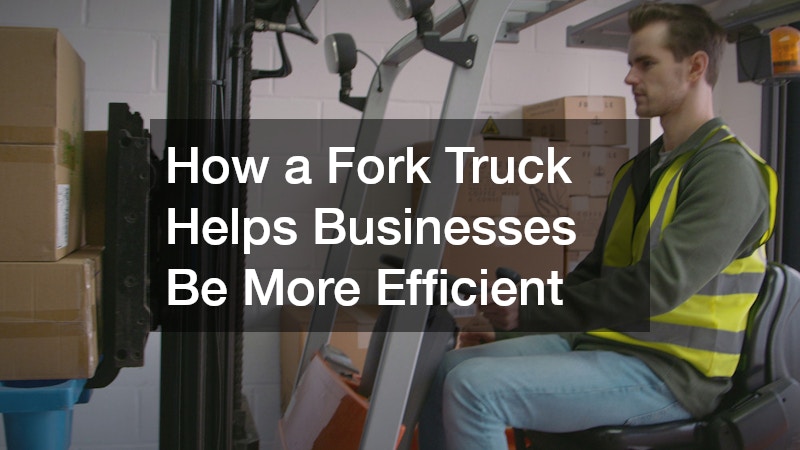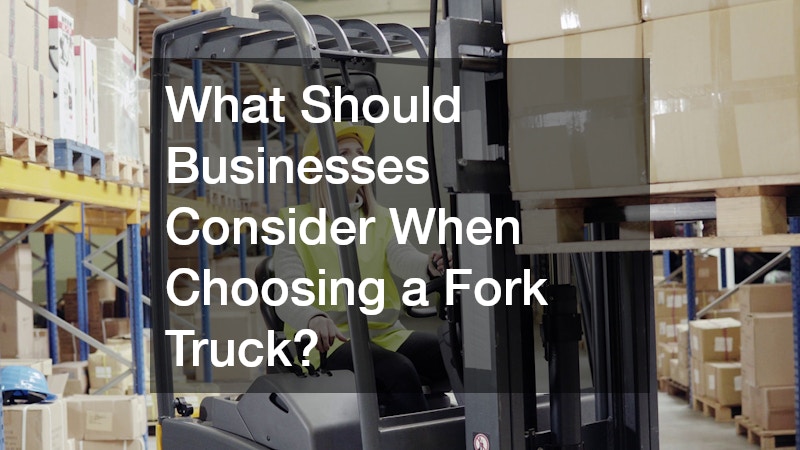
In today’s fast-paced industrial landscape, fork trucks have become indispensable assets for many businesses. These vehicles are not only crucial for enhancing efficiency but also improve productivity and safety in diverse operational settings.
Originally designed for moving light loads, fork trucks have seen incredible advancements and now offer versatile solutions in varied industries. Their evolution highlights the critical role they play in streamlining business operations.
What Are the Primary Uses of Fork Trucks in Business?
Material Handling and Transport
Fork trucks excel in material handling and transport, as they enable the swift movement of products across different sections within a facility. This capability reduces bottlenecks, ensuring that materials reach their destination efficiently.
Utilizing fork trucks for transport minimizes manual handling, reducing the chances of fatigue among workers. Consequently, this translates to more consistent and timely production cycles, which are essential for meeting business demands.
In industries like manufacturing and warehousing, fork trucks provide a level of efficiency that human labor cannot match. This advantage allows businesses to optimize their operations, achieving a competitive edge.
Increasing Productivity
The deployment of fork trucks significantly increases workforce productivity by reducing the time required for manual tasks. Employees can achieve more in less time, directly impacting a company’s output levels.
Automation through fork trucks allows businesses to reallocate workforce resources to more strategic tasks. This shift leads to improved job satisfaction and better use of human resources.
By simplifying the transportation of heavy goods, fork trucks enable workers to focus on value-added activities. This results in enhanced efficiency and a boost in overall productivity.
How Do Fork Trucks Improve Workplace Safety?
Reducing Manual Labor and Risk
Fork trucks are pivotal in minimizing the hazards associated with manual lifting and transporting heavy loads. Their ability to handle substantial weights safely reduces the risk of workplace injuries.
By mechanizing these tasks, companies can mitigate the incidence of musculoskeletal disorders among employees. This not only benefits the workforce but also decreases downtime and associated costs.
The reliance on fork trucks for heavy lifting enhances compliance with occupational health and safety standards. This compliance is crucial for maintaining a safe and legal workplace environment.
Safety Features of Modern Fork Trucks
Modern fork trucks come equipped with advanced safety features such as automatic braking systems and visibility enhancements. These innovations ensure the safety of both operators and surrounding personnel.
Improved ergonomic designs in fork trucks reduce operator fatigue, which can contribute to accidents. Enhanced controls and intuitive interfaces further bolster the usability of these machines.
Regular maintenance and safety checks are integral to maintaining the reliability of fork trucks. Businesses that invest in state-of-the-art equipment enjoy long-term benefits through lower incident rates.
What Are the Cost Benefits of Using Fork Trucks?
Long-term Savings on Labor Costs
Investing in fork trucks leads to substantial labor cost savings over the product’s lifespan. These vehicles can perform tasks faster than human workers, resulting in a leaner workforce requirement.
Businesses that capitalize on fork trucks’ efficiency can allocate resources more strategically, maximizing ROI. The reduced need for manual labor also translates to fewer health-related expenditures.
By cutting down on workforce numbers, companies can redirect funds towards growth endeavors. This shift fosters a more dynamic and competitive business environment.
Reduced Product Damage
Fork trucks minimize the risk of product damage during transport by providing stable and secure handling. This reduction in damage translates to significant cost savings in the long run.
Less product damage leads to a decrease in waste and a corresponding rise in profit margins. Businesses benefit from improved quality control and customer satisfaction.
Proper training of fork truck operators enhances handling precision and further protects product integrity. Well-maintained equipment ensures consistent performance and reliability.
How Do Fork Trucks Contribute to Operational Efficiency?
Streamlining Workflow Processes
Fork trucks are instrumental in optimizing workflow processes by allowing for seamless material movement. This coordination reduces lead times and enhances delivery schedules.
Efficient material flow facilitated by fork trucks enables businesses to meet production targets effortlessly. The synchronization of processes contributes to reduced operational costs.
By integrating fork trucks into logistics and warehouse management, businesses can streamline operations significantly. This integration results in a smoother and more predictable workflow.
Enhancing Inventory Management
The use of fork trucks in inventory management improves accessibility and organization of stock. This key advantage aids in quicker stock checking and replenishment.
Fork trucks enable systematic stacking and retrieval, which is vital for maintaining a well-organized inventory. The effective management of space is crucial for maximizing warehouse capacity.
Improved inventory handling directly supports just-in-time production models, which depend on precise stock levels. Enhanced inventory accuracy leads to better decision-making and planning.
What Should Businesses Consider When Choosing a Fork Truck?
Assessing Business Needs and Capacity
Businesses must evaluate their specific needs and operational capacity when selecting a fork truck. This assessment ensures that the equipment chosen aligns with business demands and workflow.
Consideration of factors such as load capacity, maneuverability, and operating environment is essential. These considerations impact the suitability and effectiveness of the equipment in daily operations.
Making informed decisions based on comprehensive evaluations helps optimize functionality and avoid unnecessary expenditure. A well-chosen fork truck supports long-term productivity and efficiency.
Evaluating Maintenance and Operational Costs
Businesses must carefully consider maintenance and operational costs when investing in fork trucks. These ongoing expenses play a critical role in the total cost of ownership.
Choosing models with low upkeep and energy-efficient options can reduce costs substantially over time. Forward-thinking businesses prioritize long-term savings by selecting the right equipment resources.
Strategic investments in fork trucks incorporate evaluations of future repair fees, spare parts availability, and the potential costs of eventual upgrades or replacements. This foresight protects future budgeting concerns and maximizes resource allocation.



